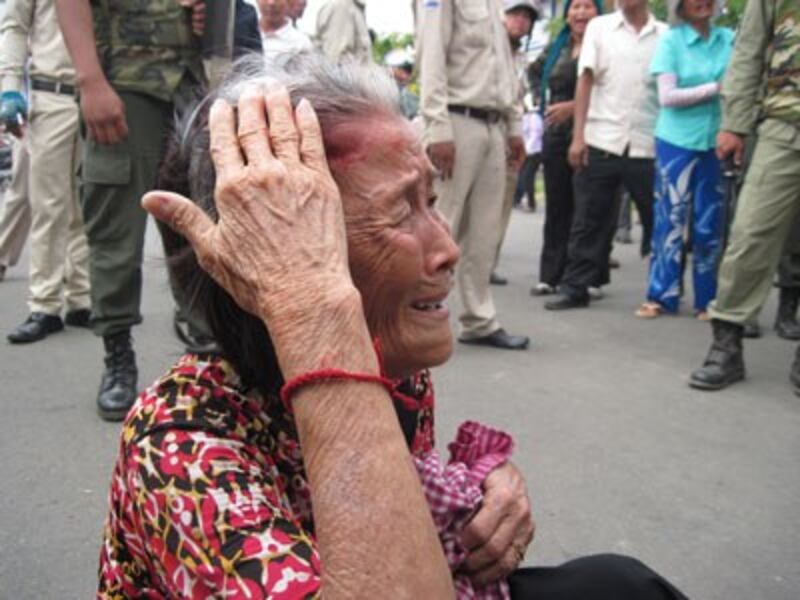Cambodian police on Thursday clashed with 100 people demonstrating in the capital against their eviction in a land deal, leaving four injured and detaining eight, according to a representative of the protesters.
The scuffle began when police armed with riot shields, wooden sticks, and batons tried to disperse the demonstrators from the Phnom Penh city hall, where they had gathered to protest the planned eviction of 1,500 families from Phnom Penh’s Boeung Kak Lake district.
The families had been told to make way for a luxury residential complex being constructed by Chinese development firm Shukaku Inc.
During the clash, three women were beaten unconscious and an elderly woman suffered a blow to her head that left her bleeding. Eight female protesters were detained and remain in police custody.
From detention, group representative Tep Vanny told RFA that one of the detainees is pregnant, while another is wounded and suffering from a broken finger.
“We are concerned about our safety, but we don’t believe we will be put in prison, because we’ve done nothing wrong,” she said.
“We only came to see [the government] demanding a solution, as we have been living a very difficult life. For four years, Shukaku has been investing in [the Boeung Kak Lake] area and has offered no [acceptable] solution for us.”
Sothun, another resident from the Boeung Kak area, said she was angered that the government had not listened to the residents' requests.
“We have demanded nothing but a solution, but they will not solve the problem for us,” she said.
“My house is flooded [from construction]. I am so unhappy … Why have they done this to the people? They beat us. They won’t seek a solution for the people because they have no sympathy for us.”
‘Violation of rights’

Chit Sam Ath, a representative of Cambodian human rights watchdog LICADHO, called the use of force by police against the protesters “too extreme” and a “serious violation of human rights.”
“Even though [the authorities] must maintain order, they should employ nonviolent means first,” he said.
“We do not take sides. We know there was a brawl. But, the people only threw plastic bottles of water and pushed the police. The authorities should be patient and apply due process.”
But Pol Pithey, Vice Commissioner of Phnom Penh, defended the police action.
“The people were cursing and [verbally] abusing the competent authorities.”
Land deal
In February 2007, the Cambodian government sold 133 hectares of land around Boeung Kak Lake to Chinese firm Shukaku Inc., which, in a joint venture with a Cambodian tycoon, plans to build a luxury housing estate next to the lake.
A total of 2,752 families have already been driven from their homes around Boeung Kak Lake, and thousands more are under imminent threat of eviction as a result of the deal.
Residents have resisted evictions for years, maintaining that the government compensation packages are too low, but have been warned that they will face legal action if they do not leave the land.
Further complicating the issue, many Boeung Kak Lake residents do not have formal titles to their land although legal experts say that many are entitled to them.
Authorities say that the land has been illegally occupied and that the residents live on state-owned land.
In March, the World Bank admitted that its land-titling program, which was shut down in 2009, did not adequately protect thousands of the lake’s residents who had been evicted over the past two years.
Ongoing issue
Cambodia’s land issue dates from the 1975-79 Khmer Rouge regime, which forced large-scale evacuations and relocations throughout the country. This was followed by mass confusion over land rights and the formation of squatter communities when the refugees returned in the 1990s after a decade of civil war.
Housing Cambodia’s large, young, and overwhelmingly poor population has posed a major problem ever since.
During his visit to Cambodia in February, the U.N. Special Rapporteur to Cambodia discussed land rights issues with the director of human rights organization ADHOC, Thun Saray.
“We propose a swift and satisfactory solution for those who have been affected by the land conflict,” Thun Saray said in an interview recounting their conversation.
U.K.-based Amnesty International said in a recent statement that as party to the International Covenant on Economic, Social and Cultural Rights and other international human rights treaties which prohibit related human rights violations, Cambodia’s government “has an obligation to stop forced evictions and to protect the population from forced evictions.”
Reported by RFA’s Khmer service. Translated by Sum Sok Ry. Written in English by Rachel Baker.
